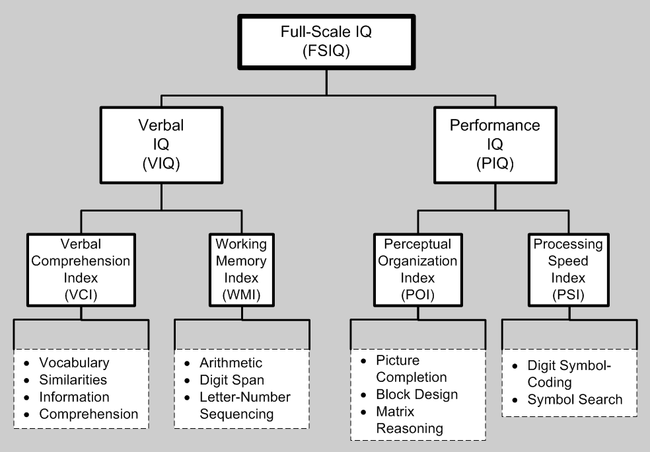This nearly always refers to Raven's Advanced Progressive Matrices, that arrangement of shapes you see online quite a bit, where you try to deduce what the next figure in a series should be.
The Wechsler Adult Intelligence Scale is the generally agreed-upon standard. It is a comprehensive test, with many subtests, and thus more fine-tuned for use with individuals being evaluated. Among adults, it is given as a usual part of an full evaluation for psychiatric inpatients. More on this later.
The Raven's is popular because it is nonverbal and so can be administered by checking boxes online. Also, It just feels like it must be less culture-bound, because it supposedly does not rely on language and education. Actually, it seems to be no better on that score. It is weighted to visualspatial abilities - which is great for you if that's your strong suit.
In fact, it's not only not a superior test, it's not a particularly good IQ test at all. It has about a 0.69 correlation with the WAIS. The WAIS includes a matrix reasoning subtest (see below), and the initial advantage of the WAIS over the Stanford-Binet was that half the test was nonverbal, requiring for example that you complete a drawing with a pencil rather than answer who wrote Faust. So they have that covered already. For those of you who took a Raven's and did great, I am sorry to bring you this news. It's just an okay measure. For those of you who took the ASVAB/AFQT for the military, that correlation is about 0.8, and the SAT/ACT is about the same. Test/retest data suggests that the WAIS only correlates 0.9-0.95 with itself, because of the differences in you on different days. So no test is going to give you a 1.00 correlation.
The SAT&ACT are IQ tests, and you can make a fair guess at your Wechsler Full-Scale from it. But what usually gets left out of that comparison is that the college-bound tests are great for measuring the abilities of groups. Because they give you a real number, and they send it to you personally and send copies to your high school and whatever colleges you hope to go to, you get suckered into thinking that they care about measuring your intelligence, very special you. From the college's POV, they are looking at 1000 kids with an SAT between 1200-1250 and predicting that the usual amount will succeed and go on to graduate at their school. They care about that aggregate, they don't care about you. A person administering a WAIS is putting together a report about you in specific, integrating not only the final score but the subtests into the conclusions. If you are average on 10 subtests but do poorly on Block Design and Matrix Reasoning, that tells the psychologist something about how your brain is working. They might even recommend a neurology consult if the differences are dramatic, as there could be some sort of damage to the brain. You were on track for a FSIQ of 100, but now it's 90, on a mix of VIQ 101 PIQ 79 = FSIQ 90.
These days you might be able to sell a school district, and then a college on the idea that you've got a specific learning disability that can be worked around and they might bring you in anyway. But in general, they are just running the numbers of the SATV and SATQ and putting you in a group which has a 70% chance of succeeding, and that's all they care about.
The ASVAB/AFQT is between the two. The military does want to slot you into a place where your skills fit, but they are also processing a lot of people and know that the test is only going to have an 80% prediction rate.
Interestingly, the Raven's has poor test/retest reliability, so that if you took the test twice, a year apart, your scores might not be all that similar.
The poor test-retest reliability of the matrix reasoning seems to be shared among the other nonverbal tests in the WAIS. This leads me to believe that daily/monthly fluctuations in cognitive abilities may be affecting tests which require intensive thinking more than those that rely on accumulated knowledge.
This makes sense to me. I can pull out that Goethe wrote Faust, supposedly one of the hardest general-knowledge questions even if I am sick, distracted, or drunk. The more difficult matrices require you to stop what you are doing and focus, mentally rechecking your work at each turn. I might do differently on different days. I believe the simple answer "Goethe" is considered just fine, BTW. Which would have been great for me as an undergrad, because I could never remember which one was Johan Wolfgang and which one was Karl Friedrich (Gauss). But it illustrates why the IQ societies say that such tests don't have sufficient ceiling for their purposes. The hardest individual questions don't differentiate between IQ 125 and 175 very well.


1 comment:
Try this hard matrix-style puzzle that Malcolm Gladwell gave in his article about Chris Langan for his book Outliers: https://i.imgur.com/u5IXks2.png
N.B. first edition of Outliers has a misprint in this puzzle. The link I gave is to the correct version.
Post a Comment